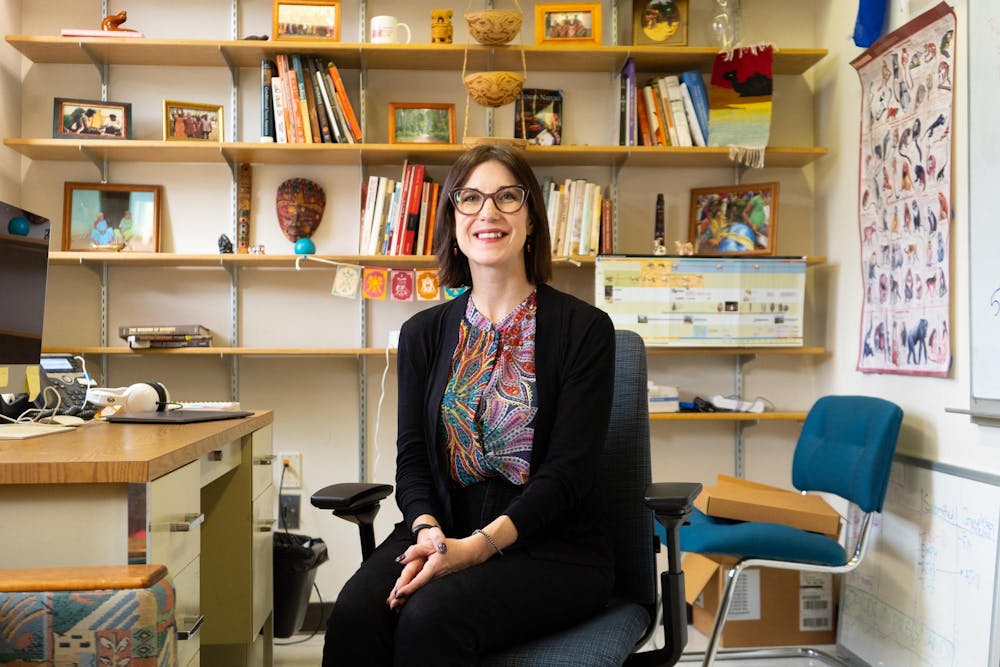Caitlyn (Caity) Placek, professor of anthropology at Ball State University, recently received the Fulbright Global Scholar award. According to Fulbright's website, the award allows U.S. academics and professionals to engage in multi-country, trans-regional projects.
Placek’s research project, “The Impacts of Cultural Models of Addiction and Motherhood: A Cross-Cultural Study,” focused on women and their recovery journey through addiction and educated others on the topic of struggle with addiction and motherhood.
Department Chair of Anthropology Robert Phillips said via email that the award is “very prestigious.” According to the program’s website, each applicant needs approval from the Fulbright Foreign Scholarship Board, the Department of State and the countries the applicant will conduct research in before applying and qualifying for the grant.
Placek has been teaching at Ball State University since 2017. She teaches courses in biological anthropology, medical anthropology, women and gender studies, as well as international women's issues.
Placek said she’s very passionate about women's rights; how to better understand addiction; and how addiction affects people of different genders, races and ethnicities.
“One better way to serve people is to understand other models of care,” Placek said. “Going to other international settings helps us to understand what those models of care are and ways they’ve solved these issues.”
She said earning the grant contributed significantly to the quality of research she was able to conduct and gave her an “incredible learning experience.” The primary goal of her project was to understand why those models and connotations associated with addiction prevent women from seeking help.
“Typically, when we think of addiction, we have some type of model in our minds of what that looks like,” Placek said. “What are the models of these factors within women's minds, and how does that impact their ability to seek recovery?”
The United States has a growing opioid crisis, according to the State Health Access Data Assistance Center. Although overdose-related deaths are decreasing across the country, Placek said many people are still in need of support — whether they’re in active addiction or various stages of recovery.
Placek said recovering from addiction is different for everybody, and many people think the only ways to recover from addiction are abstinence or attaining social capital. She said recovery is based on a continuum, and culture and gender influence the way people recover from addiction.
“I think having an open mind and taking a person-centered approach is a huge takeaway that I’d want from this research,” Placek said.
While the purpose of this research was very important to Placek and her colleagues, the travel aspect of the research was essential as well. She traveled to multiple countries, including the United Kingdom, the Netherlands and Canada.
“Even though it was a challenging experience, it was really rewarding because so many stepped up to the plate to help,” Susan Robson, a collaborator of Placek and her project, said.
Robson described Placek as “a joy to work with” and hopes to work with her on more projects in the future.
“Caity embraced her fieldwork in the northeast with passion,” Robson said. “We felt she immersed herself in the women’s recovery community.”
Phillips emphasized how Placek brings her broad expertise to the field of anthropology, specifically in the medical anthropology area, focusing on public and global health. He touched on how the research she conducted was “so astounding” and “brought great focus to the department of anthropology.”
Phillips said this study will impact people’s lives all over the world.
“The final results will help better understand how cultural models of addiction and motherhood affect the lives of women, regardless of geographic location,” he said.
The results of the research project have impacted many aspects of Placek’s life and teaching style. She said she uses her research project as an example for students when it comes time to help them understand the human decision-making process, particularly surrounding health topics.
Those interested in learning more about Placek’s cross-cultural research or offered curriculum can stop by her office in the Burkhardt Building, Room 307, or email her at cplacek@bsu.edu.
Those looking to study abroad and interested in learning about Ball State’s study abroad opportunities to conduct research and explore their career paths can visit the university’s study abroad website or visit its office in the Student Center. Applications are now open for the summer semester and close as early as Feb. 1.
Contact Linnea Sundquist via email at linnea.sundquist@bsu.edu.





